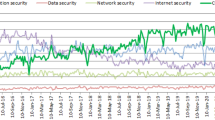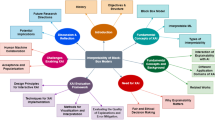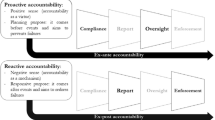Abstract
Litigation in court is still the main dispute resolution mode. However, given the amount and characteristics of the new disputes, mostly arising out of electronic contracting, courts are becoming slower and outdated. Online Dispute Resolution (ODR) recently emerged as a set of tools and techniques, supported by technology, aimed at facilitating conflict resolution. In this paper we present a critical evaluation on the use of Artificial Intelligence (AI) based techniques in ODR. In order to fulfill this goal, we analyze a set of commercial providers (in this case twenty four) and some research projects (in this circumstance six). Supported by the results so far achieved, a new approach to deal with the problem of ODR is proposed, in which we take on some of the problems identified in the current state of the art in linking ODR and AI.
Similar content being viewed by others
References
Aamodt A, Plaza E (1994) Case-based reasoning: foundational issues, methodological variations, and system approaches.. AI Commun 7(1): 39–59
Aleven V (1997) Teaching case-based argumentation through a model and examples. PhD thesis, University of Pittsburgh
Ashley KD, Aleven V (1991) Toward an intelligent tutoring system for teaching law students to argue with cases. In: Proceedings of the 3rd international conference on Artificial intelligence and Law. ACM, New York, pp 42–52
Ashley KD (1991) Modeling legal arguments: reasoning with cases and hypotheticals. The MIT Press, Cambridge
Ashley KD (2004) Case-based models of legal reasoning in a civil law context. International Congress of Comparative Cultures and Legal Systems of the Instituto de Investigaciones Jurídicas
Beer M, d’Inverno M, Jennings NR, Luck M, Preist C, Schroeder M (1999) Negotiation in multi-agent systems. Knowl Eng Rev 14(3): 285–289
Bellucci E, Zeleznikow J (2001) Representations of decision-making support in negotiation. J Decis Syst 10(3–4): 449–479
Benjamins RV, Casanovas P, Breuker J, Gangemi A (2005) Law and the semantic web: legal ontologies, methodologies, legal information retrieval, and applications. Springer
Bennett SC (2002) Arbitration: essential concepts. ALM, New York
Bonczek RH, Holsapple CW, Whinston AB (1981) Foundations of decision support systems. Academic Press, New York
Brachman R, Levesque H (2004) Knowledge representation and reasoning. Morgan Kaufmann, Massachusetts
Brams SJ, Taylor AD (1996) Fair division: from cake cutting to dispute resolution. Cambridge University Press, New York
Brown H, Marriott A (1999) ADR principles and practice. Sweet and Maxwell, London
Bruninghaus S, Ashley KD (2003) Predicting the outcome of case-based legal arguments. In: Proceedings of the 9th international conference on artificial intelligence and law, ICAIL, pp 234–242
Buchanan B, Headrick T (1970) Some speculation about artificial intelligence and legal reasoning. Stanf Law Rev 23(1): 40–62
Cáceres E (2008) EXPERTIUS: a mexican judicial decision-support system in the field of family law. In: Francesconi EBE, Sartor G, Tiscornia D (eds) Legal knowledge and information systems. IOS Press, Amsterdam, pp 78–87
Corcho O, Fernández-lópez M, Gómez-pérez A, López A (2005) Building legal ontologies with METHONTOLOGY and WebODE. In: Law and the semantic web: legal ontologies, methodologies, legal information retrieval, and applications. Springer, pp 142–157
De Vries BR, Leenes R, Zeleznikow J (2005) Fundamentals of providing negotiation support online: the need for developing BATNAs. In: Proceedings of the second international ODR workshop. Wolf Legal, Tilburg, pp 59–67
Forsyth R (1986) The anatomy of expert systems. In: Yazdani M (eds) Artificial intelligence: principles and applications, ch. 8. Chapman & Hall, London, pp 186–187
Greinke A (1994) Legal expert systems—a humanistic critique of mechanical legal inference. Murdoch Univ Electron J Law 1(4)
Gruber TR (1993) A translation approach to portable ontologies. Knowl Acquis 5(2): 199–220
Guasco MP, Robinson PR (2007) Principles of negotiation. Entrepreneur Press, Newburgh, New York
Harmon P, King D (1985) Expert systems: artificial intelligence in business. Wiley, New York
Hayes-Roth F, Waterman DA, Lenat DB (1983) Building expert systems. Addison-Wesley, Boston
Jackson P (1990) Introduction to expert systems. Addison-Wesley, Boston
Katsh E, Rifkin J, Gaitenby A (1999) E-commerce, E-disputes, and E-dispute resolution: in the shadow of eBay law. Ohio State J Disput Resolut 15: 705
Katsh E, Rifkin J (2001) Online dispute resolution—resolving conflicts in cyberspace. Jossey-Bass Wiley Company, San Francisco
Kolodner JL (1992) An introduction to case-based reasoning. Artif Intell Rev 6(1): 3–34. doi:10.1007/BF00155578
Kolodner JL (1993) Case-based reasoning. Morgan Kaufmann, San Francisco
Landes WM, Posner RA (1976) Legal precedent: a theoretical and empirical analysis. J Law Econ 19: 249
Lodder A, Thiessen E (2003) The role of artificial intelligence in online dispute resolution. In workshop on online dispute resolution at the international conference on artificial intelligence and law. Edinburgh, UK
Lodder AR (2006) The third party and beyond. An analysis of the different parties, in particular the fifth, involved in online dispute resolution. Inf Commun Technol Law 15(2): 143–155
Lodder AR, Zeleznikow J (2010) Enhanced dispute resolution through the use of information technology. Cambridge Unversity Press, Cambridge, UK
Matthijssen L (1995) An intelligent interface for legal databases. In: Proceedings of the 5th international conference on Artificial intelligence and law. ACM, New York
Matthijssen L (1999) Interfacing between lawyers and computers: an architecture for knowledge-based interfaces to legal databases (law and electronic commerce). Kluwer Law International, The Netherlands
Notini J (2005) Effective alternatives analysis in mediation: “BATNA/WATNA” analysis demystified. Available at http://www.mediate.com/articles/notini1.cfm . Accessed in 05/2005
Olson GM, Malone TW, Smith JB (eds) (2001) Coordination theory and collaboration technology. Erlbaum, Mahwah
Oskamp A, Tragter M, Groendijk C (1995) AI and law: what about the future?. Artif Intell Law 3(3): 209–215
Parunak HVD (1997) Go to the ant: engineering principles from natural multi-agent systems. Ann Oper Res 75: 69–102
Peruginelli G, Chiti G (2002) Artificial intelligence in alternative dispute resolution. In: Proceedings of the workshop on the law of electronic agents–LEA 2002
Popple J (1991) Legal expert systems: the inadequacy of a rule-based approach. Australian Comput J 23(1): 11–16
Popple J (1996) A pragmatic legal expert system. Applied legal philosophy series. Ashgate, Dartmouth
Rahwan, I, Simari, G (eds) (2009) Argumentation in artificial intelligence. Springer, Berlin
Raiffa H (2002) The art and science of negotiation. Harvard University Press, Harvard, USA
Salton G, Wong A, Yang CS (1975) A vector space model for automatic indexing. Commun ACM 18(11): 613–620
Searle JR (1980) Minds, brains and programs. Behav Brain Sci 3(3): 417–457
Sowa JF (2000) Knowledge representation: logical, philosophical, and computational foundations. MIT Press, Cambridge
Span G (1993) LITES, an intelligent tutoring system for legal problem solving in the domain of Dutch civil law. In: Proceedings of the 4th international conference on Artificial intelligence and Law. ACM, New York, pp 76–81
Steinbach, M, Tan, PN, Kumar, V (eds) (2005) Introduction to data mining. Pearson Addison Wesley, Reading
Susskind R (1987) Expert systems in law: a jurisprudential inquiry. Clarendon Press, Oxford
Sycara K (1993) Machine learning for intelligent support of conflict resolution. Decis Support Syst 10: 121–136
Thiessen EM (1993) ICANS: An interactive computer-assisted multi-party negotiation support system. PhD Dissertation, School of Civil & Environmental Engineering, Cornell University, Ithaca, NY
Thiessen EM, Fraser K (2003) Mobile ODR with SmartSettle. In: Proceedings of the UNECE forum on ODR
Turban E (1993) Decision support and expert systems: management support systems. Prentice Hall, NJ
Turing AM (1950) Computing machinery and intelligence. Mind 59: 433–460
Tyler C (2005) 115 and counting: the state of ODR 2004. In: Conley Tyler M, Katsh E, Choi D (eds) Proceedings of the third annual forum on online dispute resolution. International conflict resolution centre, University of Melbourne in collaboration with the United Nations Economic and Social Commission for Asia and the Pacific
Velasquez JD (1997) Modeling emotions and other motivations in synthetic agents. In: Proceedings of the national conference on artificial intelligence. Wiley, pp 10–15
Visser PRS, Bench-Capon TJM (1998) A comparison of four ontologies for the design of legal knowledge systems. Artif Intell Law 6(1): 27–57
Waterman DA, Peterson M (1980) Rule-based models of legal expertise. In: The proceedings of the first national conference on artificial intelligence. Stanford University
Watson I (1997) Applying case-based reasoning: techniques for enterprise systems. Morgan Kaufmann, CA
Walton PRE, McKersie RB (1991) A behavioral theory of labor negotiations. Cornell University Press
Wooldridge M (2002) An introduction to multiagent systems. Wiley
Wooldridge M, Jennings NR (1995) Intelligent agents: theory and practice. Knowl Eng Rev 10(2): 115–152
Zeleznikow J, Hunter D (1994) Building intelligent legal information systems: representation and reasoning in law. Kluwer Computer/Law Series, Deventer-Boston, pp 230–237
Zeleznikow J, Stranieri A (1995) The split-up system: integrating neural networks and rule-based reasoning in the legal domain. In: Proceedings of the 5th international conference on artificial intelligence and law. pp 185–194
Zeleznikow J, Bellucci E (2003) Family_Winner: integrating game theory and heuristics to provide negotiation support. In: Proceedings of sixteenth international conference on legal knowledge based system, pp 21–30
Zeleznikow J, Bellucci E (2004) Building negotiation decision support systems by integrating game theory and heuristics. In: Proceedings of the IFIP international conference on decision support systems
Zweigert K, Kötz H (1998) An introduction to comparative law, 3rd edn. Clarendon Press, Oxford
Author information
Authors and Affiliations
Corresponding author
Rights and permissions
About this article
Cite this article
Carneiro, D., Novais, P., Andrade, F. et al. Online dispute resolution: an artificial intelligence perspective. Artif Intell Rev 41, 211–240 (2014). https://doi.org/10.1007/s10462-011-9305-z
Published:
Issue Date:
DOI: https://doi.org/10.1007/s10462-011-9305-z




